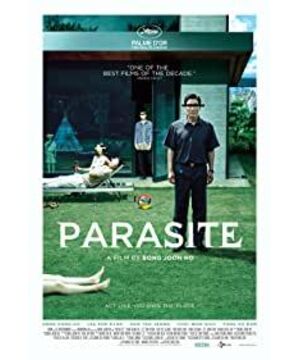"Parasite" is a movie that disappointed me.
I don't like the symbol of "the taste of the poor", it is too deliberate and too ineffective. Stones, pizza, insects, insecticides, men peeing, and a series of symbols such as semi-basements, basements, and mansions, I don’t think I have used them well. Either it's too blunt, it's too stressful, or it's anticlimactic.
I don't like the upper class described in "Parasite". The upper class is not so stupid and sweet. Trust people so easily, let the daughter of high school be alone with the young male tuition teacher; easily believe one recommendation after another; easily believe in the frame of the old nanny. It seems that there is no social experience, and no life ability at the same time. Even big things like finding a nanny need to wait for the driver to recommend it.
People in the upper class have a stable social circle, and they will not easily trust the staff. They go to a nanny to find a tutor, to buy clothes and wine, and they will seek the advice of their friends. They will have a fixed consumption brand and a fixed trust service organization.
New Money may not be so stubborn, but they have created a foundation on their own and have a strong survivability. They will not be so merciless at all.
I also don't like the bottom society described in "Parasite". The bottom society does not have such powerful capabilities. Can help people learn English, and can easily handle the naughty boy. You can drive professionally and do housekeeping to make the hostess impeccable. The reason why the bottom is the bottom, what they lack most is not money, but vision and energy. The poor life at the bottom makes people have no energy to study, no energy to think, and it is difficult to plan for the future.
The so-called taste of the poor is not a smell, but a despair of giving up, a kind of helpless suffocation. Unfortunately, "Parasite" did not express it at all.
In my opinion, the whole movie broke down when the old nanny rang the doorbell on a rainy night.
The whole family is reveling in the owner's house. How can such a dangerous move allow the old nanny to come in? If the screenwriter is a little attentive, this problem is actually very easy to solve. For example, the old nanny followed their family and obtained evidence that they were actually a family, so as to threaten to enter the villa. However, the movie made the old nanny plead for a few words, and let the family put themselves in danger. This is not kindness, this is madness.
Everything later seemed quite unreasonable. A family of three eavesdropped and suddenly fell down. The owner of the mess all over the floor could not find out. The entrance to the basement became a blind spot of vision...
All kinds of irrationality are due to insincereness. Movies cannot sincerely face the world, face life. The feeling that the movie gives me is that I found a strange idea and then developed into a movie. Those symbols don't need to think and design more, just give them straight away.
"Parasite" even reluctant to criticize anyone. Although the president in the movie is selfish and dislikes the taste of the poor, he and his wife have given full trust to the bottom level and given generous remuneration. They all need to find reasons for dismissing the wrong employees. At best, he and his wife are indifferent rich people.
Is this the way the upper class squeezes the bottom? totally not.
In "Burning", the upper class uses credit cards, consumerism, and even knowledge and knowledge to squeeze the bottom layer, making the bottom layer easily a toy discarded after getting tired of playing. When doing all this, the people at the upper echelons did not even have consciousness and no sense of guilt.
When P2P thunders, who have you seen come out to be responsible to the victims? When the building is unfinished, which developer have you seen come out to explain the situation? After the environment has been polluted, which manufacturer have you seen apologize to the villagers?
Because they don't think they have done anything wrong. You gamble on a future with all your wealth. His answer is that investment is risky, and he is willing to bet. You do your best to find a job, and he tells you that you should do it at all costs.
This is the gulf of class.
"Parasite" describes the upper class as if the porter said that the emperor must use a golden pole.
"Parasite" is also reluctant to criticize the bottom layer.
Is the life at the bottom like this? Don't talk about living, contacting, just watching those documentaries, you know that's not the case. Xu Tong's "The Homeless" trilogy, Fan Lixin's "Homecoming Train", NHK's "Sanhe Talent Market". Survival resources are too scarce, and contacts are too narrow. Life at the bottom is full of cunning, deceit, warmth and hurt.
It is really impossible for them to master so many skills, and they really don't know how to deal with the upper class. In "The Barber at Xiaozidong", the family goes to the president's family banquet, and being at a loss is the only possible way of expression. Where can I be as easy as "Parasite".
The description of "Parasite" on the bottom life seems to say why not eat meat.
I imagine that if "Parasite" uses magical realism, this family is really parasitic. They devour one host after another, and then become the master, consuming all the resources and then looking for the next prey. That's fun.
Because I saw at the beginning of the movie, the family was too much to be fumigated by pesticides, and I really expected the parasites in their bodies to crawl out.
View more about Parasite reviews











